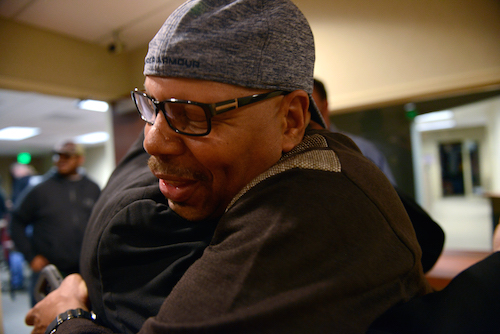
This post originally appeared at IBEW.
"This is a fantastic moment for our new brothers and sisters and one of the largest organizing election victories any union has seen in years," said International President Lonnie R. Stephenson. "This will transform not only their lives, but the lives of their families, and I think it will be an inspiration for working people across the U.S. and Canada."
BG&E workers will now form a new local—Baltimore Local 410—chosen because it is the area code served by BG&E. It will be the first time Stephenson will charter a new local since becoming international president.
As the vote approached, the campaign accelerated into a four-week blitz of house calls, rallies, and phone banks. More than 80 volunteer organizers from IBEW locals across the country converged on Baltimore. IBEW organizers and BG&E workers rallied at the gates of the nine service centers before the sun rose and after it set, greeting shift changes in the winter snow and rain. They called every person eligible to vote at least once and made hundreds of house calls across the state.
Volunteers were rank and file construction, utility, manufacturing and telecom members who came from more than a dozen states, some from as far away as Ohio, California, Tennessee and Montana. They were joined by volunteers from nearby locals, whose support was crucial, including Baltimore Local 24 –which hosted campaign meetings and donated office space-- and Washington locals 26 and 1900.
"It was the first organizing campaign that brought the full strength of the IBEW, all our brothers and sisters -- construction, professional and industrial -- together in one common cause," said Assistant to the International President for Membership Development Ricky Oakland. "With our combined strength, we won an organizing campaign bigger than any in recent memory for any union in the U.S."
More than two dozen members of the volunteer organizing committee watched the ballots counted by hand in the offices of the National Labor Relations Board in Baltimore Thursday night.
When the final tally was announced, campaign leader and veteran BG&E lineman Dave Kelly yelled "We did it! Finally, we did it."
BG&E workers first approached the IBEW to form a union more than two decades ago. There have been four unsuccessful campaigns, one close and three blowout losses, and all were deeply contentious.
In 1996 the utility spent more than $50 million on union-busting consultants and the IBEW filed dozens of unfair labor practice charges against the company, said IBEW Utility Department Director Jim Hunter, who led that campaign as the then-business manager of Washington Local 1900. Two years later, after the NLRB negotiated a rerun. Nearly 3,000 votes were cast and the campaign lost by just 120.
"It was heartbreaking," Hunter said. "We didn’t get close after that."
The organizing elections, in 2000 and 2010, lost by more than 2-to-1.
"That company from seven years ago is gone, though, and we noticed the changes and we don’t like them," said VOC-member Ben Ferstermann.
Over the years, a merger between BG&E and Washington-based Pepco failed and BG&E was purchased by Exelon in 2011. Ferstermann says they began to see more favoritism, more unexplained disciplinary actions and more contractors.
They also watched as wages and benefits got better at the rest of Exelon’s utilities including Pepco, PECO in Philadelphia and Delmarva in Delaware. Exelon owned only one utility that wasn’t represented by the IBEW: BG&E, and only one utility’s workers were falling behind the rest.
"It’s not a bad company. Everything I have is because of my job at BG&E and I want them to do better," said BG&E worker Eric Gomez. "We just wanted to do better too."
In January 2016, BG&E workers came back to the IBEW with another request for help organizing.
Fourth District International Vice President Kenny Cooper, lead organizer Troy Johnson and organizer Bert McDermitt came back to them with a strategy for a vote the following January with one requirement: the campaign would be led by the workers themselves, not the IBEW.
"We were clear from the start. We were not organizing them. It was their campaign and we would do everything we could, throw everything we had, at supporting them. But they had to do it," Cooper said. "Both sides delivered what we promised, and that is why we won."

